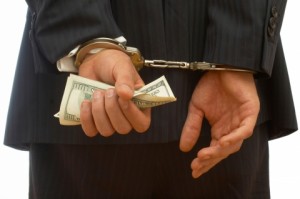 Public corruption law holds those people who try to buy influence and undue advantages from public officials and those officials who let it happen accountable for their illegal actions. It is a complex area of the law that includes a number of offenses, all of which differ from the rest based on very specific distinctions. A bribe, for example, is very similar to an illegal gratuity, but while the latter carries a prison sentence maximum of only 2 years, the former’s maximum is much higher at a prison sentence of 15 years. Prepare to face your public corruption charges with the knowledge of what you’re being charged with and how that charge differs from other, extremely similar charges. To read the rest, visit part 2 of our public corruption glossary.
Public corruption law holds those people who try to buy influence and undue advantages from public officials and those officials who let it happen accountable for their illegal actions. It is a complex area of the law that includes a number of offenses, all of which differ from the rest based on very specific distinctions. A bribe, for example, is very similar to an illegal gratuity, but while the latter carries a prison sentence maximum of only 2 years, the former’s maximum is much higher at a prison sentence of 15 years. Prepare to face your public corruption charges with the knowledge of what you’re being charged with and how that charge differs from other, extremely similar charges. To read the rest, visit part 2 of our public corruption glossary.
Bribery: Bribery of a public official, being any member of Congress or any person acting on behalf of or working for the United States Government, is defined as follows: A person corruptly gives or promises something of value to a public official with the intent to influence an official act.
Illegal Gratuity: An illegal gratuity is something of value given or promised to a public official with the intent to “curry favor” or thank the official for a previous favorable action. This differs from a bribe because the intent of the exchange is not to affect an official act.
Extortion: Extortion occurs when a person uses threats, intimidation, or coercion to compel another person to willingly relinquish money, goods, services, or in the case of extorting a public official, favorable future action.
Have you been charged with one of these or an other white collar crime in the Newark area? Contact the experienced public corruption lawyers at the law firm of Robert J. DeGroot!

